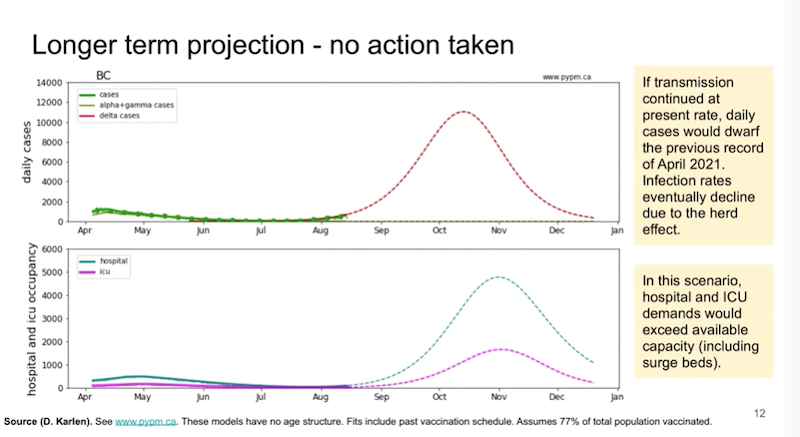Experts warn that coronavirus cases in British Columbia could reach unprecedented levels based on recent modelling.
The BC COVID-19 Modelling Group works on rapid response modelling of the pandemic, with a special focus on British Columbia and Canada. The independent group was arranged by Prof. Caroline Colijn of Simon Fraser University (SFU) and Prof. Dan Coombs of the University of British Columbia (UBC) with support from the Pacific Institute for the Mathematical Sciences.
In its latest report released Aug. 18, the group finds that infections in B.C. have grown exponentially for nearly five weeks, "doubling about every nine days (growing 8 [per cent] each day)."
If infections continue based on these projections, the report states that the "rising Delta wave" will see hospitalization and ICU occupancy rapidly increase and that children will be disproportionately affected during this wave.
The report also emphasizes that "urgent" action is required to reduce transmission and expand vaccination coverage. If no action is taken, "cases will soon exceed record levels."
By mid-October, reported cases could reach close to 12,000 per day and by November upwards of 5,000 people would need to be hospitalized, should nothing change.
"I suppose there are reasons to wait later but that would not be my choice."
Prof. Eric Cytrynbaum of the University of British Columbia tells Vancouver Is Awesome that modelling work isn't meant to predict what will happen. Instead, the group releases projections of what could happen based on current behaviour.
"We gauge what’s currently happening by fitting the parameters of a model," he explains. "In this case, we then propose a hypothetical situation like “suppose current behaviour, restrictions etc all remain the same as they are, indefinitely - what would happen?” Under that assumption, we see case numbers, hospitalizations and ICU occupancy going above all previously seen levels."
But Cytrynbaum notes that the group expects health officials "would move to change those conditions no matter what and stop the train wreck" before that happens.
"The only question is when will they do it. I would hope early (given that we have the tools to foresee such things -models and data) to avoid unnecessary overloading of our health care system.
"I suppose there are reasons to wait later but that would not be my choice."
Colijn also emphasized that the report shows "projections" rather than predictions.
"It's likely that individuals and policy-makers will make decisions that may change things," she tells V.I.A. "So we might say for example that if the seven to 10 day doubling time continues to be constant, then we would have record-high numbers of infections in the coming weeks."
When asked about breakthrough infections — instances where fully vaccinated people become infected with the virus — Cytrynbaum said they are not likely to represent a significant portion of the infections based on the projections. "That would be predominantly unvaccinated individuals."
Have a look at a video of the modelling report.
With a file from Graeme Wood.



